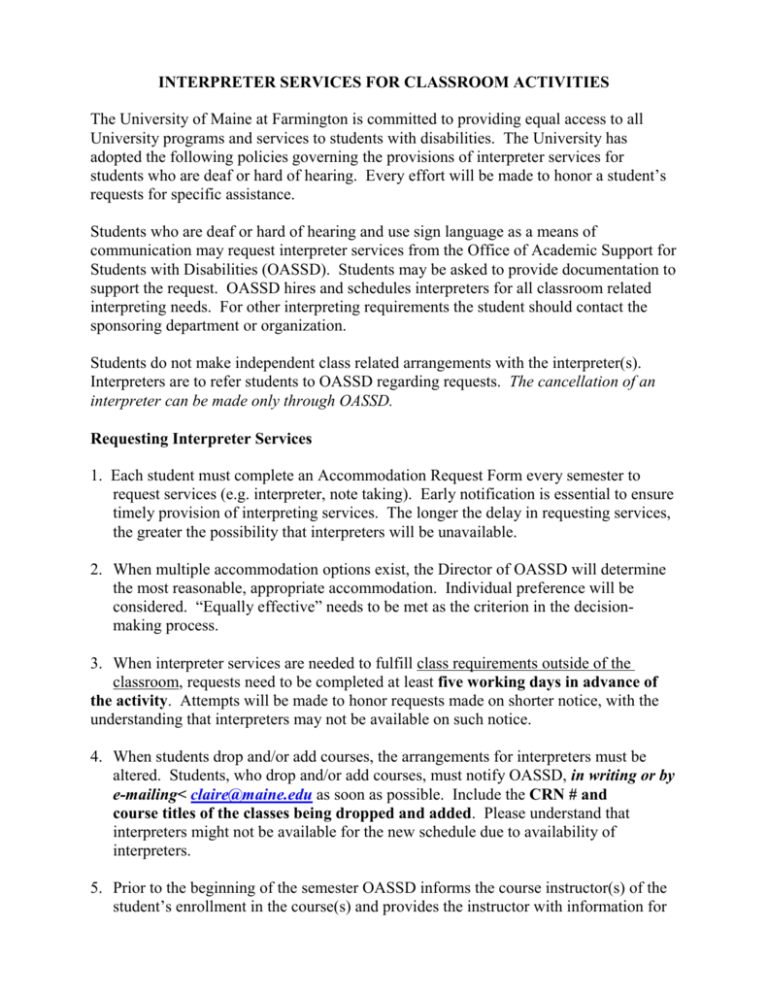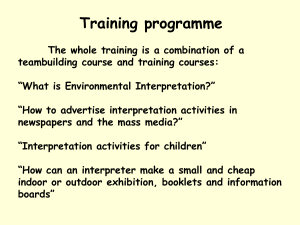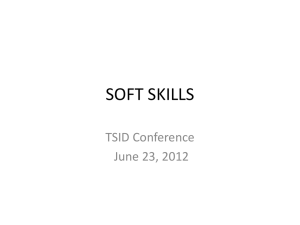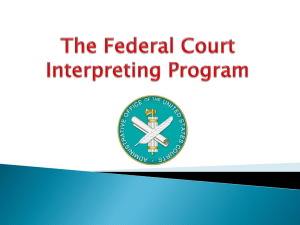INTERPRETER SERVICES FOR CLASSROOM ACTIVITIES
advertisement

INTERPRETER SERVICES FOR CLASSROOM ACTIVITIES The University of Maine at Farmington is committed to providing equal access to all University programs and services to students with disabilities. The University has adopted the following policies governing the provisions of interpreter services for students who are deaf or hard of hearing. Every effort will be made to honor a student’s requests for specific assistance. Students who are deaf or hard of hearing and use sign language as a means of communication may request interpreter services from the Office of Academic Support for Students with Disabilities (OASSD). Students may be asked to provide documentation to support the request. OASSD hires and schedules interpreters for all classroom related interpreting needs. For other interpreting requirements the student should contact the sponsoring department or organization. Students do not make independent class related arrangements with the interpreter(s). Interpreters are to refer students to OASSD regarding requests. The cancellation of an interpreter can be made only through OASSD. Requesting Interpreter Services 1. Each student must complete an Accommodation Request Form every semester to request services (e.g. interpreter, note taking). Early notification is essential to ensure timely provision of interpreting services. The longer the delay in requesting services, the greater the possibility that interpreters will be unavailable. 2. When multiple accommodation options exist, the Director of OASSD will determine the most reasonable, appropriate accommodation. Individual preference will be considered. “Equally effective” needs to be met as the criterion in the decisionmaking process. 3. When interpreter services are needed to fulfill class requirements outside of the classroom, requests need to be completed at least five working days in advance of the activity. Attempts will be made to honor requests made on shorter notice, with the understanding that interpreters may not be available on such notice. 4. When students drop and/or add courses, the arrangements for interpreters must be altered. Students, who drop and/or add courses, must notify OASSD, in writing or by e-mailing< claire@maine.edu as soon as possible. Include the CRN # and course titles of the classes being dropped and added. Please understand that interpreters might not be available for the new schedule due to availability of interpreters. 5. Prior to the beginning of the semester OASSD informs the course instructor(s) of the student’s enrollment in the course(s) and provides the instructor with information for working with interpreters and students who are deaf or hard of hearing. Students are expected to follow up this introduction by identifying themselves to the instructor(s) to discuss the use of an interpreter and the student’s individual accommodations. Class Attendance and Student’s Responsibilities 1. Planned Absences such as workshops, trips or other scheduled absences: A student who has requested interpreter services and then finds that he or she will not be attending the class or event in question must cancel the arrangements by notifying OASSD, in writing or by e-mail, < claire@maine.edu at least forty-eight (48) hours before the class or event is to take place. If the cancellation is for a Sunday or Monday event, notification must be received before 4:00 p.m. the Friday preceding the event. The University must give interpreters advance notice in order to not be billed for services. A student who fails to cancel a reservation will be considered “absent”. For purposes of this policy “absent” means that the student failed to use a valuable service that he or she requested. The cancellation of an interpreter can be made only through OASSD. 2. If an absence as described above is beyond the student’s control, the student must explain, in writing or by e-mail < claire@maine.edu, the circumstances of the absence to OASSD within three (3) days of the absence. For good cause shown, OASSD may excuse absences. If the student does not offer an explanation within three (3) days after the absence, except for extenuating circumstances, that absence cannot be excused. 3. Late arrival – Interpreters will leave and the student will be considered “absent” under the following circumstances: a. Student not arriving by 20 minutes after a class session begins in classes less than or equal to 90 minutes; b. Student not arriving 30 minutes after a class session begins in classes that are longer than 90 minutes. After three unexplained absences in a class of less than two hours or two unexplained absences in a class of more than two hours, interpreting services will be suspended until the student has discussed the situation with the Director of OASSD. After a total of four unexplained absences in a class of less than two hours or three unexplained absences in a class of more than two hours, services may be suspended for the remainder of the semester. Unexplained absences are understood to mean that the student did not attend class and did not notify OASSD personnel 48 hours in advance or provide written notice within three days of an unexpected absence. Continuing problems with unexplained absences will be dealt with on an individual basis and may result in the suspension of services. Interpreter’s Role and Working with the Interpreter Interpreters are hired to facilitate communication in the classroom between the student and instructor and between the student and classmates. The University contracts with private agencies and independent contractors to provide effective, qualified interpreters. All interpreters must have experience in post-secondary settings and/or demonstrate the ability to handle discourse at this level. If your needs are not being met or you are having difficulty understanding the interpreter: 1. Check yourself first. a. Have you done your homework and studied all the material you were supposed to study? You must be prepared for each class. b. Raise your hand and ask questions when necessary. There are probably other students who did not understand either and they will be glad you asked. 2. If you determine the interpreter is not transmitting information clearly, try to identify the specific problem (sloppy finger spelling, ASL v SEE v CASE, too slow, struggling with the material, not objectively regarding the material, distracting attire, etc.). Discuss with the interpreter what you perceive to be the issue. Often the interpreter can make necessary adjustments and resolve the problem. If the problem cannot be resolved directly, arrange to meet with the Director of OASSD as soon as possible. 3. If the interpreter does not show up for class within the first half hour, the student should make arrangements with the professor and notify OASSD as soon as possible. Suggestions for Succeeding in the Classroom 1. Arrive early the first day of class to introduce yourself to the interpreter and position yourself for the best view of the interpreter, instructor, and any visual information displayed. 2. Be on time. Interpreters wait 20 minutes for students in classes less than or equal to 90 minutes, 30 minutes for classes that are longer than 90 minutes. 3. Direct your questions to instructor(s) or appropriate staff. The interpreter is not a tutor or an aide. 4. Be accountable for your own learning. Like hearing students, deaf students are responsible for their attention in class and the information presented. The interpreter cannot be responsible for retaining or repeating information the student missed. Notetaking services are available and should be requested as needed. 5. Know or become familiar with the class vocabulary and material. 6. Make an appointment to see the instructor if the subject matter is unclear. 7. Participate in class discussions. To get the instructor’s attention raise your hand or call the instructor’s name. Do not rely on the interpreter to get the instructor’s attention for you. The interpreter’s role is to facilitate communication between you and the instructor. 8. Do not initiate private conversations with the interpreter during class time. The interpreter is there to facilitate communication and will voice/interpret everything that is signed/spoken. 9. The interpreter may be several words or sentences behind the speaker. This delay is to ensure that the interpreter is understanding and conveying concepts appropriately and accurately. Therefore, do not be alarmed if the interpreter is still signing after the instructor has finished speaking.









